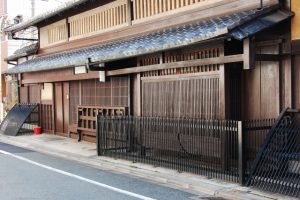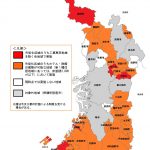
Overview Summary of the Residential Business Act
On 10 March, 2017, Residential Accommodation Business Act which designates the measures to prevent troubles with residents and to ensure public health was approved by cabinet and submitted to the diet on the same day.
And the law starts on 15 June,2017.
This law is very complicated for foreigners who live in Japan or who want to start residential business in Japan.
So,we summarize the point of Residential Accommodation Business Act.
We are very happy if the article is useful for foreigners who love Japan.

Definition of the types of residency that can be notified
Among the residencies that can be notified are “residential buildings that can actually be used by people as the main base for their lives”, “residential buildings in which the recruitment of dwellers takes place”, and “residential buildings that can be provided at any time for dwelling of the owner, lessee, or sublessee”. In terms of “residential buildings that can actually be used by people as the main base for their lives”, the guidelines state that “this does not cover cases where said residential building is only used on a short-term basis”.
“Newly-built investment condominiums only for private residence” with no dwelling history are also not allowed
For “residential buildings that can be provided at any time for dwelling of the owner, lessee, or sublessee”, it is stated that this does not cover investment condominiums that are newly constructed only for private lodging and for which there is no dwelling history. Actual examples of a residential building covered by this in the guidelines are “second houses lived in for the holidays”, “vacant houses that despite moving the main residence to temporarily due to employment transfer are owned for the purpose of being provided as residences again in the future”, “vacant residences owned due to inheritance, but are not currently being lived in full-time, but are planned to be provided for residence use in future”, and “old-Japanese style houses that are not the main base for living, but are used as a separate residence”.
The “kitchen, bathroom, toilet, washroom” can be in a main building.
The private lodging guidelines start with a definition of a residency. These include the provision that the “kitchen”, “bathroom”, “toilet” and “washroom facilities” do not need to be located in the same building. For example, even in the case of an “annex” that does not have a bathroom, as long as there is a bathroom within the “main building” of the same premises, this will not be a problem. On the other hand, even if there are public bathing facilities nearby, these cannot take the place of a “bathroom”, “toilet”, or “washroom facilities”.
“One day” even if a short time, or the date does not change
In the New Private Lodging Act guidelines, “If you have a record of allowing people to stay in the notified residence on receiving a lodging fee, regardless of whether it is a short period or whether the day changes, this is calculated as one day”. Additionally, the manner in which the days are counted is clearly “the number of days the person stays”, and does not include the “recruitment days”.
As long as a “bathroom” has a shower, it does not need a bathtub
This states that as long as there are shower facilities within the bathroom, it does not actually need a bathtub. There is also a description that indicates that the New Private Lodging Act does not differentiate between the type of toilet, so this can be Japanese-style or Western-style.
“Recruiting dwellers for appearances sake” for the purpose of creating evidence is not allowed
“Residence buildings in which the recruitment of dwellers takes place” refers to dwellings in which recruitment for lot-based sale, sale, or lease” is carried out while private lodging business takes place. On the other hand, it states that cases where intentionally disadvantageous transactions conditions and recruitment content is included to prevent applications from potential dwellers are not covered under “residential buildings in which the recruitment of dwellers takes place”. This is to prevent “recruitment for appearances sake”, with the purpose of creating documentary evidence.
It is not possible to notify one “residence” in duplicate
It is stated that it is not possible for a residence to be notified in duplicate by multiple operators. On the other hand, where a residence is owned jointly by multiple people, it can be notified in their joint name.
Whereas there are no restrictions placed on rejection of lodging, this cannot be based on discrimination or prejudice
Whereas there are restrictions placed on rejecting people who desire to take up lodging within the Inns and Hotels Act, no such restrictions are placed on the residence lodging (private lodging) business. In other words, it is stated in the New Private Lodging Act guidelines that setting requirements on lodgers “within a reasonable range”, this does not breach the New Private Lodging Act. On the other hand, it states that “it is necessary to bear in mind that where the reason for refusing lodging is discriminatory or based on prejudice, this is inappropriate based on the conventional wisdom”.
The documentation issued by the government or public agency, that is attached to the notification, must be from within the past 3 months
In the guidelines, from among the documentation attached to the notification on the private lodging operator side, the documentation certified by the government or public agency must have been issued within the past three months. Additionally, copies (reproductions) of these original documents are not considered acceptable.
It is not necessary for a “residence” to be one building
In the New Private Lodging Act guidelines, it is possible to notify part of a building as a “residence.” Even in the case of diagrams attached at the time of the notification, unless items specified by the government are revealed, this will only cover the point in question.
It is “desirable” to explain to surrounding residents
In the New Private Lodging Act guidelines, it is stated only that it is “desirable” to explain in advance to surrounding residents when notifying. Additionally, for neighboring residents to be able to confirm whether a particular property has been notified by the lodger or not, it is said to be “desirable” for the prefectural governor to publish the notification number and address.

In case of a condominium, report to the management union in advance
If you want to run a private lodging business using a shared residence building, such as a condominium, you will need “documents to evidence the fact that there is no intention in the management union for the notified residence to prohibit operating the residence lodging business in respect to the condominium.” In such a case, after “the notifier reports that they shall carry out a residence lodging business to the management union in advance”, they shall require a “written oath confirming that at the time of notification, a policy prohibiting a residence lodging business had not been decided at a General Meeting or Director’s Meeting” or “Documentation proving that it had been confirmed from meeting minutes of General meetings and Director’s Meetings since the enactment of the law that there was no intention to prohibit residential lodging businesses for the notified residence from the management union”.
Compulsory to secure 3.3㎡ or more per lodging person
It is necessary to ensure floor area of “3.3㎡ or more” per lodging person in rooms for which the private lodging business is conducted. The reason for this is given as the fact that “hygiene-related risks, such as infections, increase when an unspecified high number of people are gathered in one place”. Additionally, under the guidelines, floor area refers to “the area of the part that the lodgers may occupy”, and does not include the space for “kitchens, bathrooms, toilets, washrooms, corridors, closets or alcoves”.
The drawing of the residence may be “hand-drawn”
Under the New Private Lodging Act guidelines, “the drawings of the residence” that need to be submitted at the time of the notification “may be handwritten drawings on the condition that include al of the necessary items stipulated under the law.
Fire Prevention Act Suitability Notification Required
In the New Private Lodgings Act guidelines, it states that notification “is required to be submitted in accordance with the Fire Prevention Act Suitability Notification Document.” The reason for this is the “aim to ensure appropriate management of the residential lodging business, by guaranteeing that the notified residence is in compliance with the Fire Prevention Act”.
Respond to complaints of neighboring residents at “any time of the day or night”
It is described that, in relation to complaints and inquiries from residents in the surrounding areas, “it is necessary to constantly provide support or telephone support, at any time of the day or night”. Additionally, when the response is on hold, “it is necessary to give consideration to replying at a later date, after clarifying the response deadlines to the other party”.
“Monthly mansions” should be managed on a separate site to private lodging intermediaries
The New Private Lodging Act guidelines also touch on the handling of “monthly mansions”. In regard to “monthly mansions”, it clarifies that “mixing their display on a private lodging intermediary site with those described above that are mainly temporary lodging is not appropriate, so it is necessary to manage these on a separate site.
Where lodgers are foreign nationals, the necessary items should be presented to them in foreign languages
In order to ensure the comfort and convenience of foreign national lodgers, by “preparing documents with the necessary items described in the rooms” or “by display on a tablet terminal”, it is “desirable to allow the lodger to view such items as necessary while they are lodging at the notified residence”. Based on the above, it states that “in particular, in regard to the contact point for notification at the time of a fire etc., preparations should be taken to allow them to confirm swiftly in case of an emergency.” ”Information concerning means transportation means for movement”, specified in the law, refers to information concerning the route to convenient facilities, such as the nearest stations etc., and the means of transportation that can be used.”, whereas “guide to contact points in the case of fire, earthquake, or other emergencies”, refers to the provision of information describing the methods of contacting the fire department, police department, medical facilities, and the residential lodging management company.
It is mandatory for “the names of all lodgers” to be described in the lodger roster
In the New Private Lodging Act guidelines, the description of the names of the lodgers in the lodging roster “needs to involve description of all lodgers. Simply listing a representative is not permitted”, and “description should enable understanding of who the lodgers are by each lodging agreement (lodging group)”.
Regulatory restrictions that separate “living together-type” and “absent-type” are “inappropriate”
When local government enact the private lodging regulations, “regardless of whether it is the type where the landlord lives together or where the landlord is absent, the aim is to ensure the appropriate management of the business, and, therefore, placing restrictions on the residential lodging business separately for the type where the landlord lives together and where they are absent is not appropriate.” This is based on the fact that even where the landlord is absent, suitable management can take place by outsourcing the job of the administrator.
Confirmation of identity should be “face-to-face” or using a “method utilizing ICT”
For confirmation of identity at the time of check-in, it is “necessary to carry this out face-to-face, or by using an equivalent method utilizing ICT (information communication technology) that satisfies the following conditions. When utilizing ICT to confirm identity, being able to “clearly confirm the face and passport of the lodger through the image”, and “confirm that the said image is transmitted from the sales office of the residential lodging operator or residential lodging management company, from within the notified residence or near the notified residence” are conditions. The guidelines state, as an example, “methods utilizing videoconferencing or tablet terminals prepared at the notified residence etc.”

It is not necessary for the outsourcee of part of the work to be an “administrator”
It is not necessary for the outsourcee to be residential lodging management company. In the guidelines, it states that “the residential lodging operator and the residential lodging management operator, with whom which a management outsourcing agreement has been concluded, shall take responsibility for the execution of the residential lodging management work by the housing lodging management company.
In case the private lodger outsources the management work, this shall only be outsourced to “one contractor”
In the guidelines, where the residential lodging management work is outsourced to a residential lodging management operator, “it is not permitted to divide the work between multiple contractors when outsourcing, or have the residential lodging operators themselves take on a portion of the residential lodging management work”.
Taking out fire insurance or liability insurance is “desirable”
When providing notification under the Private Lodging Act, it is considered ”desirable” that the operator takes out fire insurance and liability insurance in respect to third parties, but no duty is imposed on the Private Lodging company.
As an administrator, “subcontracting all the work” is not allowed, but “subcontracting part of the work” is allowed
Additionally, whereas it is described that “there is no problem in the residential lodging administrator subcontracting out part of the work to another person”, it is not allowed to subcontract all of the management work.
The excessive “zero day regulation” code is deviates from the objectives of the New Private Lodging Act
In the guidelines, it is emphasized that the objective of the New Private Lodging Act is that “residential lodging business is promoted under suitable regulation”. Based on this, in the private lodging regulations enacted by local government, it is stated that “under the regulation, the uniform regulation of residential lodging business over all of the periods in a year, and uniform regulation of all regions such as prefectures and municipalities deviates from the intentions of this Act, and are not appropriate.”
It is “desirable” for signs to be posted on the gate or in the entrance
Under the New Private Lodging Act guidelines, “it is desirable for signs to be presented in a position where they can be recognized publicly, such as on the gates or entrances of the notified residence (entrance to the front of the building) at a height of between 1.2-1.8 meters (between the height of the gate for presenting nameplates etc. to the standard size of the entrance door of 2 meters).“ Based on this, “it is desirable to create or process this with something that is wind-resistant, such as lamination processing etc.”
Intermediaries shall report number of lodging days for the published properties to the Environmental Agency
Residential intermediaries shall report the “residential lodging operator trade name and name”, “address and notification number of the notified residence”, and “number of days people have stayed at the notified residence” to the Environmental Agency for the previous six-month period up to April 15th and October 115th each year.
Where 180 days per year are exceeded, this is a “Violation of the Inns and Hotels Act”
In the New Private Lodging Act, an upper limit of 180 days per year is determined. If the private lodging operator allows people to lodge for more than 180 days per year, and they have not obtained a license under the Inns and Hotels Act, “they shall be in violation of Article 3(1) of the Inns and Hotels Act in terms of the excess amount of lodging”.
Where the registration number etc. cannot be confirmed they are “not displayed”
Where information on the notification number cannot be confirmed using the method touched on in the previous item, properties relating to the private lodging site “may also use methods of electronic processing which are non-displayed”.

Strictly control loaning for “purposes of love hotel”
The New Private Lodging Act guidelines discusses “the case of a residence lodging business that is loaned on an hourly basis, effectively for the purpose of being a love hotel”. In this case, “as there is considered to be a high risk that confirmation of identity shall not be appropriately carried out, based on this Act or the Entertainment and Amusement Trades Control Act, the prefectural police shall strictly control this by issuing a work improvement order or work suspension order etc.”
Intermediaries are prohibited from publishing “illegal private lodging”
“Private lodging intermediaries” determined under the New Private Lodging Act are prohibited from mediating or contributing to the convenience of “facilities clearly displaying a fake notification number”, “”receiving of lodging services from operators without licenses in the hotel and inn business”, and “action of receiving provision of services breaching the “Anti-Prostitution Act”.
In cases where the landlord lives in the same residence and it is 50㎡ or less, the installation of emergency lighting equipment is not required
In the guidelines, the necessity of applying safety measures is explained as follows, in accordance with the method of building and the scale of the notified residence, in the following table. In the case of both a stand-alone house or a common residence, where the landlord lives in the same residence, and the floor space is 50㎡ or less, regardless of the format of the stand-alone house or common residence, the installation of emergency lighting equipment is not required.
It is mandatory for private lodging operators to enter their notification number when registering site publication
Under the guidelines, it is prohibited for intermediaries to publish illegal private lodging properties. For this reason, within the framework of the New Private Lodging Act, Inns and Hotels Act, event private lodgings and special section private lodgings, it is essential to be able to confirm the facility name and notification number. Based on this, it is necessary on our private lodging site to “check the notification number etc. and enter the notification number etc. of the residence lodging operator etc. on the private lodging site that we are managing”.
It is mandatory to replace sheets and covers
It is necessary for bedding, such as sheets and covers, to be replaced with clean ones every time a new lodger moves in. Additionally, in the facilities, equipment etc. must be maintained in a sterile state, and “should be periodically cleaned and ventilated, paying attention to dehumidification to prevent the occurrence of mites or mold etc.”
How do you feel about these points of Summary of the Residential Business Act?
The acts are very complicated and difficult for ordinary people especially for foreigner in Japan.
But don’t worry about it.
We are supporting for people who want to start the Residential Business.
If you have any inquiries,please contact us.
Inquiry Form








